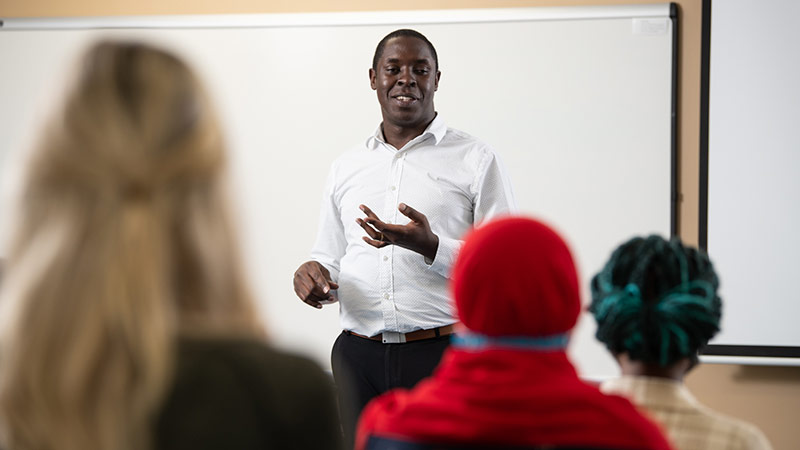UNB-led research project aims to improve access to mammograms for Arabic-speaking refugee women
Author: Marisa Lancione
Posted on May 15, 2023
Category: UNB Saint John , UNB Fredericton

In Canada, one in eight women will be diagnosed with breast cancer in their lifetime. The probability of survival at least five years after diagnosis is 88 percent. Over the past decades, breast cancer's mortality rate has decreased, partly because of early detection through screening. However, despite Canada’s universal health-care system and provincially led breast cancer screening programs, immigrant and refugee women face inequities in accessing breast cancer screening.
A research project led by the University of New Brunswick (UNB) looks to close this gap. Dr. David Busolo, assistant professor in UNB’s faculty of nursing, and an interdisciplinary team of researchers, clinicians and community members are trying to improve mammography uptake for Arabic-speaking refugee women in New Brunswick.
Over the past seven years, New Brunswick has seen an influx of Arabic-speaking refugee women. For women in this population, access to mammograms was an issue in their home countries. Although refugees do undergo medical screening upon arrival in Canada, it is often focused solely on communicable illnesses.
“Refugee populations struggle to access social services in general, but, with respect to breast cancer, some refugees arrive from countries where their health-care systems have only focused on the treatment of disease,” said Dr. Busolo. “When they get to Canada, there are all these health promotion strategies geared at improving their health. However, if health promotion and how our systems are structured do not resonate with them and where they’re coming from, they may not participate in those opportunities.”
There are more than just cultural differences in the approach of health-care systems. Refugee populations often face several social determinants of health that cause barriers to accessing health care, including language, accessibility, education and economic factors, among others.
For example, one breast cancer screening promotion strategy in New Brunswick is to send letters to homes across the province.
“But if you don’t know the language and can’t read what it says, you’re probably just going to look at the letter, throw it out and not follow up,” said Dr. Busolo. “Or, if you get the letter, but the clinic is 50 kilometres away, and you don’t have a car, what are you going to do?”
Despite the recent uptick in Arabic-speaking refugees in New Brunswick, limited research has been conducted on the social determinants of health that create barriers to accessing mammograms in the province.
On May 15, the Canadian Cancer Society awarded the UNB-led project one of six inaugural Health Equity Research Grants, which aim to improve outcomes by reducing cancer-related health inequities. The funds will help the research team document mammography initiatives and gaps and develop culturally appropriate strategies to improve access for Arabic-speaking refugee women.
“We want the women to come together and come up with strategies,” said Dr. Busolo. “Oftentimes there are projects where the researcher says you need to do x, y, z and sometimes that works perfectly, but sometimes it fails, especially if the approach does not resonate with participants. So, we really want to engage and empower women to come up with strategies that will work for them. As researchers, we will provide our expertise and work with the women to determine what those strategies are and what they will look like.”
The goal is to share culturally appropriate strategies with the province and health-care providers who can put them into practice. Not only will these strategies positively impact access to breast cancer screening, but they may also translate to inequities in other health promotion strategies in the Atlantic region and the rest of Canada.
The research team involves UNB faculty of nursing researchers Dr. David Busolo and Tracey Rickards; Catherine Holtmann, professor in UNB's department of sociology and the director of the Muriel McQueen Fergusson Centre for Family Violence Research; Robin Urquhart, the Canadian Cancer Society Endowed Chair in Population Cancer Research and an associate professor at Dalhousie University; Sara Edge, associate professor at the Toronto Metropolitan University; Chantal Arsenault, a nurse practitioner at the Refugee Clinic in Moncton; Arabic-speaking patient partners Mohammad Ziad and Asia Alabbas; Eshwar Kumar, medical director of the NB Cancer Network; and Lisa Bamford De Gante, executive director of the Multicultural Association Network of Fredericton.
